By Cheng Yuezhu Source: China Daily 2024-04-11
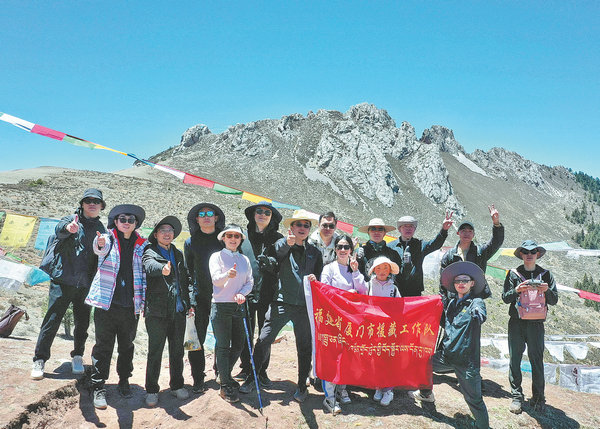
The Xiamen support team to Zogang. [Photo provided to China Daily]
Downtown Zogang, a county in the Xizang Autonomous Region's Chamdo, lies beside a river and against an expanse of mountains. A wooden plank path winds its way up the mountain, allowing visitors to go hiking and embrace the county's beauty.
Every night, the county welcomes tourists with a bustling scene. At its central square, locals and visitors gather in circles and dance without inhibition, enacting the bonfire dance of the Tibetan ethnic group at festive occasions.
Up until 2019, Zogang was listed as an impoverished county, and its transformation couldn't have been achieved without special teams from the coastal city Xiamen, Fujian province, which lies around 2,100 kilometers away.
In 2016, Fujian province established a partnership with Chamdo to aid its development. Cities from Fujian began offering one-on-one assistance to counties in Chamdo, and among them, Xiamen paired with Zogang.
Each year, experts from various fields take the journey and work in the county.
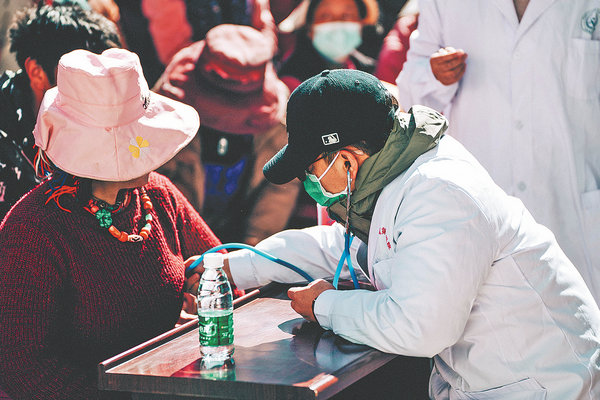
Associate chief physician Li Jiurong from the First Affiliated Hospital of Xiamen University examines patients in Zogang county, Xizang Autonomous Region. [Photo provided to China Daily]
Li Jiurong, an associate chief physician at the First Affiliated Hospital of Xiamen University, is one of them. In April 2023, along with three doctors and one administrative specialist from the hospital, he arrived at the Zogang county hospital to begin their one-year service.
As the Xiamen hospital is involved in the paired assistance program, it called for volunteers and Li immediately applied, knowing that one of the concerns in the region is the lack of pulmonary specialists in the high-altitude region.
"Because of the high altitude, we suffered from dizziness, headaches and insomnia when we first arrived. Now, having been here for several months, we still cannot participate in strenuous activities. We'd find ourselves quite breathless after climbing three flights of stairs, let alone jogging," Li says.
Since their arrival, they have been journeying to the county's villages, offering free medical consultation and contributing to the county's plan to provide all residents with a free health checkup, as well as working at the hospital.
"Although Zogang is considered a small county, its area is quite expansive, and the population is scattered. Also, most of them are busy farming, so they won't come to the county hospital unless it's absolutely necessary," he says.
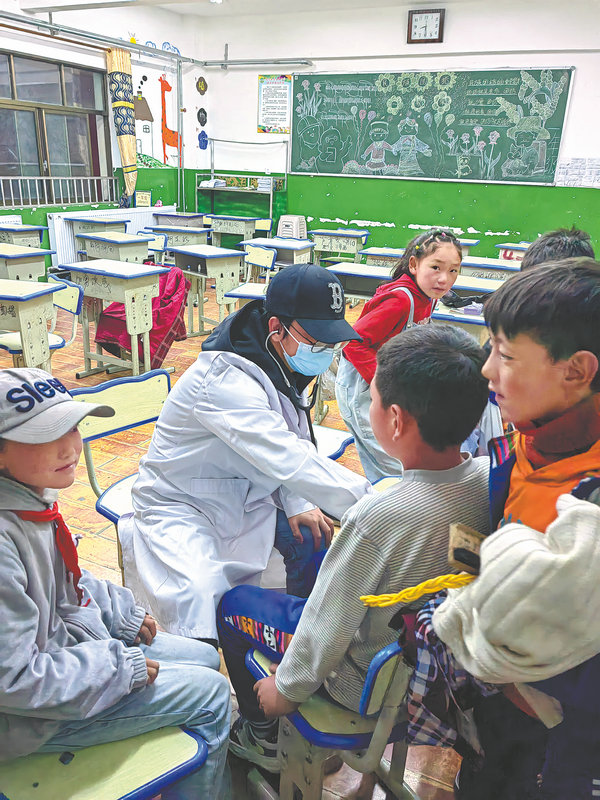
Associate chief physician Li Jiurong from the First Affiliated Hospital of Xiamen University examines patients in Zogang county, Xizang Autonomous Region. [Photo provided to China Daily]
As it can take up to six or seven hours by car to go to a village, when Li and his colleagues go on these trips, they usually spend a week or two in the village and offer medical services to the locals despite the limited medical infrastructure and accommodation.
Among Zogang's total 144 healthcare facilities, the vast majority are village clinics, and there is only one county-level hospital and 10 health centers.
Even the county-level hospital lacks medical workers and specialized departments, so, although Li specializes in pulmonary and critical care medicine, he often has to work as a general practitioner with limited equipment.
In one recent case, the patient suffered from a severe pneumothorax, and might have needed to be transferred to a hospital in another province for surgical treatment.
However, to relieve the patient's pain and prevent urgent complications from developing, Li crafted a makeshift apparatus using an intravenous injection bottle, tubes and a balloon, to remove the excess air. To their delight, the patient's condition significantly improved after four days of careful treatment.
"I chose to come here because I want to contribute to the best of my ability. This is of course within the constraints of available facilities, but we can still teach the local medical practitioners through practical demonstrations. Whenever they can conduct a treatment independently, I feel a sense of reassurance," Li adds.
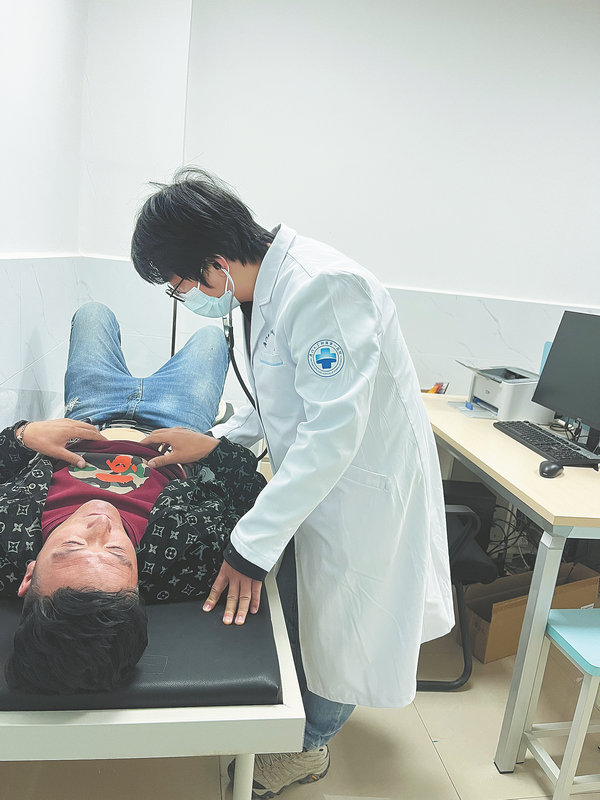
Associate chief physician Li Jiurong from the First Affiliated Hospital of Xiamen University examines patients in Zogang county, Xizang Autonomous Region. [Photo provided to China Daily]
Tashi Drolma, deputy head of Zogang county, expressed her appreciation for the medical resources from Xiamen and support from the national, provincial and municipal governments, which made the collaboration possible.
"The Xiamen medical experts are mentoring and training our local medical workers, significantly advancing our medical workforce and leading to substantial improvements in the skills of our healthcare professionals as a whole," she says.
"They have also contributed to the development of our healthcare industry and enhanced the overall quality of medical services available to our local people."
Since the program's launch, the Xiamen government has been cooperating with that of Zogang, addressing their specific requirements and dispatching professionals from various fields as per their needs.
This includes both long-term services lasting a year, and short-term exchanges of one or two weeks. During these exchanges, experts arrive in Zogang to conduct training sessions, or conversely, study tours of Tibetan students are organized to go to Xiamen.
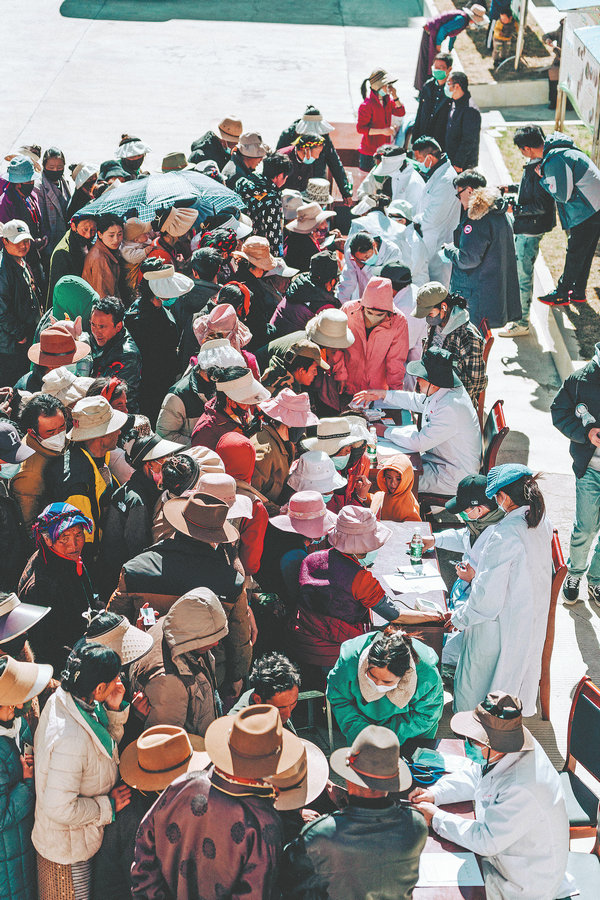
The medical team from the First Affiliated Hospital of Xiamen University to Zogang gives free medical consultations. [Photo provided to China Daily]
Zogang art troupe, the members of which regularly lead the dance in the county's central square, has participated in these exchanges multiple times.
In April, performers from the troupe staged an original play in Xiamen, as well as exchanged ideas and performed with Xiamen's folk dance and music ensembles.
In July, two teachers from the Xiamen Art School flew to Zogang and offered a week's training in dancing and hosting to members of the Zogang art troupe.
Tang Kele, a dancing instructor, says that the troupe consists of nearly 30 performers, most of whom never received professional training.
Their participation in the troupe is driven by their passion for singing or dancing, and most of the art troupe's programs are created spontaneously by the performers according to their own interests.
"Because I specialize in folk and ethnic dance, I actually prepared a folk dance program in advance. But when I arrived, they told me that they started working on a street dance program, and hoped that I could help them complete the choreography," Tang says.
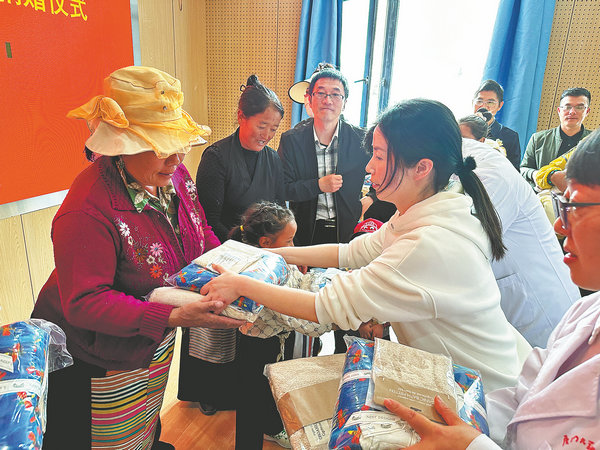
Ding Shuangfeng, administrative specialist of the medical support team, distributes supplies at a donation event. [Photo provided to China Daily]
For him, it is also a mutual learning experience. During the trip, he also filmed videos of local Tibetan ethnic dance, so that his students in Xiamen can better grasp the ethnic characteristics and connect with its raw vivacity.
With the talent and funds provided by Xiamen, projects in fields and industries, such as grape and walnut oil production, are underway.
Since last year, members of the Xiamen support team, including Ke Haitao, a cadre from Xiamen now serving as a deputy head of Zogang county, have been conducting field trips to help Zogang advance its grape production and processing industries.
"In the development of the grape industry, we conducted two surveys in the grape-growing regions of Yunnan and Sichuan provinces, visiting 12 major wine companies," Ke says.
Other approaches include standardizing the management of grape plantations, registering trademarks and attracting investment, to ensure Zogang's high-quality and sustainable development.